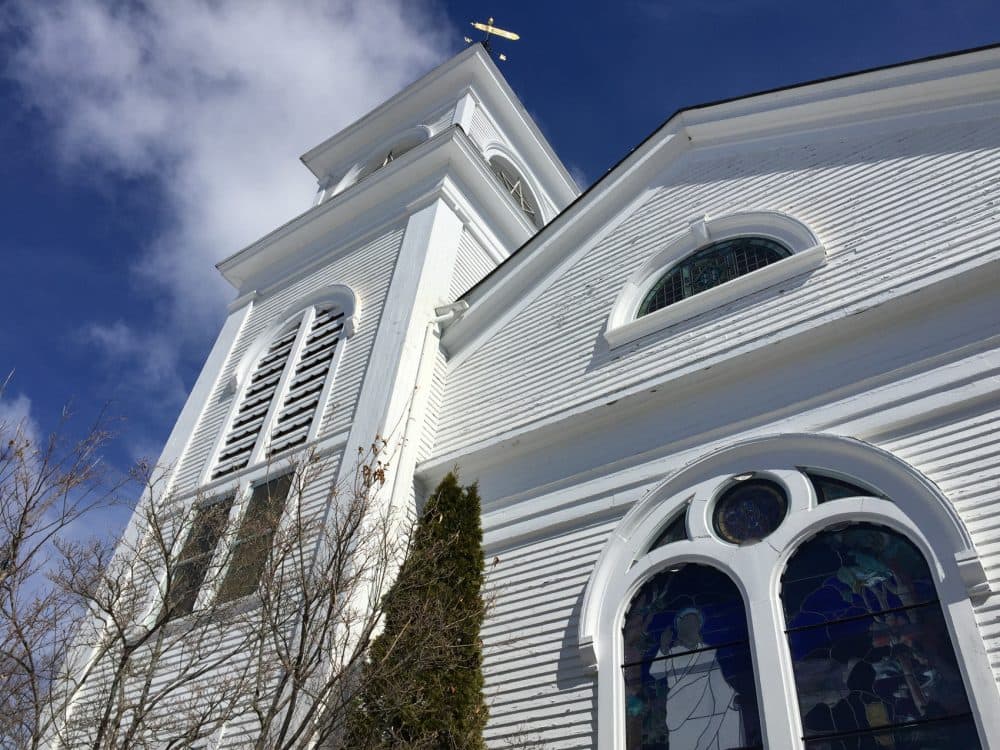Advertisement
Acton Church At Heart Of Controversy Over Use Of Public Funds For Historic Preservation
Resume
A church in Acton is at the heart of a legal case that could affect many towns in Massachusetts.
The town of Acton had previously approved public funds to fix up the old church, voting for $100,000 in community preservation grants for repairs.
But as a result of a decision Friday by the state's highest court, the town must now show that the grants do not violate the Massachusetts Constitution.
The church is a large building in the heart of town, which doesn't consist of much more than the church and the town hall. Like many churches around the state, the church applied for funds from the Community Preservation Act, or CPA, to restore its stained-glass windows and develop a master plan for the church building and two nearby houses.
Leaving Sunday services, Jackie Stanton hoped the town would prevail.
"Because it's a beautiful town," Stanton said. "It's got a lot of history, and regardless of what church it is, what denomination it is, if it's in a building that is history, I'm all for that."
The interim senior minister for the Acton Congregational Church declined to comment.
Selectman Peter Berry said Acton has used CPA money to preserve several historic churches.
"Historic structures in town provide a sense of roots to residents in town and a sense of place which add measurably to the culture of the town and the social fabric that knits the town together," Berry said in a telephone interview.
But 12 Acton taxpayers objected to the grants to this church.
On Friday, the Supreme Judicial Court granted them a partial victory. It stopped the use of public funds to restore the stained-glass windows until a lower court could decide whether the grant violates the Massachusetts Constitution. It prohibits the "use of public money... for... maintaining or aiding any church."
In suspending the grant, the court indicated that in its view, the objecting taxpayers are likely to win their case.
The Acton residents who filed the suit are represented by the Washington-based Americans United for Separation of Church and State, which saw this as a test case.
Eric Rothschild, an attorney for the organization, said the Supreme Judicial Court has put churches and towns on notice.
"The closer this funding comes to the aspects of the church that used for worship or that have religious aspects, like the stained-glass windows, the closer they are going to scrutinize the funding," Rothschild said in an interview.
The group of residents who filed the lawsuit said they would not speak to the press.
The American Civil Liberties Union also joined the lawsuit. Attorney Anthony Doniger wrote its brief.
"The fact of the matter is it's not just like any old historic building," Doniger said in an interview. "It is a church, and funds that go to a church, even though they may be used for what ostensibly appears to be neutral non-religious uses can have the effect of aiding the church and aiding the religious practices of the church. Why? Because it frees up other money that the church can use."
Acton was represented in arguments before the SJC by Nina Pickering-Cook. She pointed out that the court agreed with the town that the Massachusetts Constitution does not ban outright the award of public funds to active churches for historic preservation or other public purposes. But she has some worries.
"I'm concerned that the SJC has now set that bar somewhat high, which may chill the willingness of town and state agencies to grant those funds to restore important historic resources just because they are owned by religious institutions," Pickering-Cook said. "Acton has always believed that these historic resources deserve protection regardless of who owns them at any particular point in time."
The church in Acton is used by townspeople for many things. It's one reason churchgoer Ruth Richards supports using public funds to preserve the church.
"It's not just a place of worship," Richards said leaving Sunday services. "It's got a very thriving thrift shop in the basement that's open a number of times a week that serves the community. It hosts AA meetings and other programs. If the church ever had to close because it couldn't afford to maintain itself, then that resource would no longer be available."
Churches in Yarmouthport, Easton, North Andover, and Westford have used Community Preservation Act funds for preservation of their buildings.
Perhaps the most notable church to have used such funds is Old Ship Church, in Hingham, the oldest church building in the United States to have been continually used as a church. These churches have served as the center of town life as far back as the 17th century.
The use of public funds for their preservation may now be in conflict with another Massachusetts tradition: the separation of church and state.
This segment aired on March 12, 2018.
